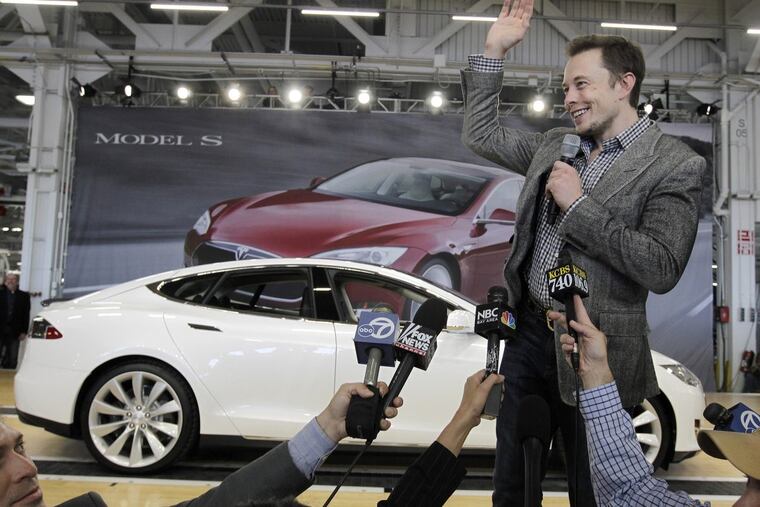SEPTA consultant and Elon Musk trade punches over future of mass transit | Inga Saffron
At the heart of the dispute is a concern that Musk's transportation innovations will favor the rich.

Among people who think deeply about the best way for people to get from Point A to Point B, billionaire tech entrepreneur Elon Musk is a visionary. From his electric Tesla cars to his reusable SpaceX supply rockets and his proposal for an underground Hyperloop commuter tunnel, Musk is credited with reimagining transport as we know it.
But Musk revealed a crucial blind spot recently when he lashed out on Twitter at Jarrett Walker, a SEPTA transit consultant who was hired this year to help modernize Philadelphia's bus routes.
Musk, it turns out, doesn't much care for a mode of transportation that is considered crucial to the health of big cities: mass transit.
Although Musk's views should come as no surprise, given that Tesla is the company that turned electric cars into a luxury commodity, Musk stunned the audience at a tech conference in early December when he suggested that mass transit had no future. After telling the group that mass transit "sucks," he explained that he prefers "individualized transport" because buses and trains are filled with "a bunch of random strangers, one of whom might be a serial killer."
After his remarks were picked up by Aarian Marshall at Wired magazine, Walker was so dismayed, he took to Twitter to reprimand the inventor. He suggested Musk was an elitist for his disdain of transit and suggested that innovations like driverless cars and the Hyperloop would help only the rich.
"You're an idiot," Musk shot back.
Musk picked the wrong transportation expert to criticize. After helping cities like Houston dramatically increase ridership, Walker has become something of a celebrity among transit planners. Dozens came to his defense and Vancouver, British Columbia, planner Brent Toderian started a hashtag, #greatthingsthathappenedontransit!, to recount pleasant interactions between strangers on buses and trains.
Like Musk, Walker has upended the conventional wisdom about transportation. Because he believes that frequency and reliability are the key to running a successful bus network, he has often advised cities to rethink unpopular routes and focus attention on high-demand corridors. Walker's company, Jarrett Walker + Associates, is currently taking a hard look at Philadelphia's bus network.
Although Musk later deleted the tweet criticizing Walker, the impact of the exchange ricocheted around the Twittersphere. That was in large part because Musk's anti-transit sentiments cut to the heart of urbanist unease over driverless cars, a technology that Tesla has been trying to perfect. Although some hope those autonomous vehicles will be a boon for cities by reducing the need for land-intensive parking lots, others worry that the reverse will happen. Walker has warned that driverless cars will take up the same amount of space as regular cars. They could also encourage more of the kind of low-density land use that produced suburban sprawl.
Along with developing driverless cars, Musk's company is working on a system of tunnels, the Hyperloops, that would allow commuters to bypass street-level traffic. Maryland officials have already given Musk permission to start experimental boring. Unlike transit, which follows a fixed route, Musk claims his Hyperloop would take people door to door without the need for transfers for other modes.
"I think public transport is painful. It sucks," Musk said in his remarks. "Why do you want to get on something with a lot of other people, that doesn't leave where you want it to leave, doesn't start where you want it to start, doesn't end where you want it to end? And it doesn't go all the time."
But Walker and other transportation experts predict that the Hyperloops will never be able to handle large volumes of users and will end up as bypasses for the very rich. Some Hyperloop scenarios show the system serving private cars, while others suggest it would used by pods accommodating a dozen or so people, all going to the same destination. But many doubt whether any scenario is technologically or economically feasible.
"The reigning fantasy of Musk's argument is that we must always 'take people all the way to their destination,'" Walker wrote in a blog post last year. "To do this we must abolish the need to ever change vehicles — from a train to a bus, from a car to a train, from a bus to a bike — and of course we also abolish walking."